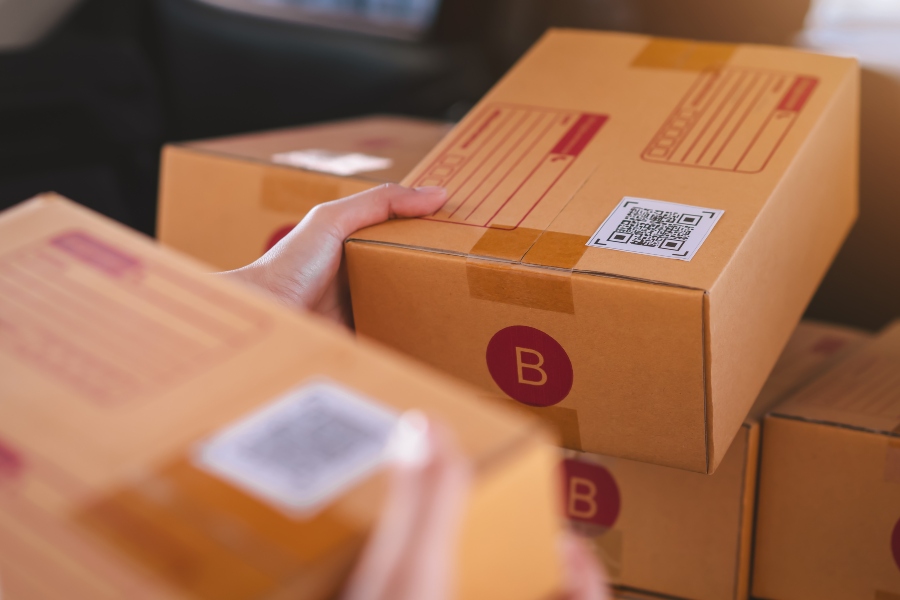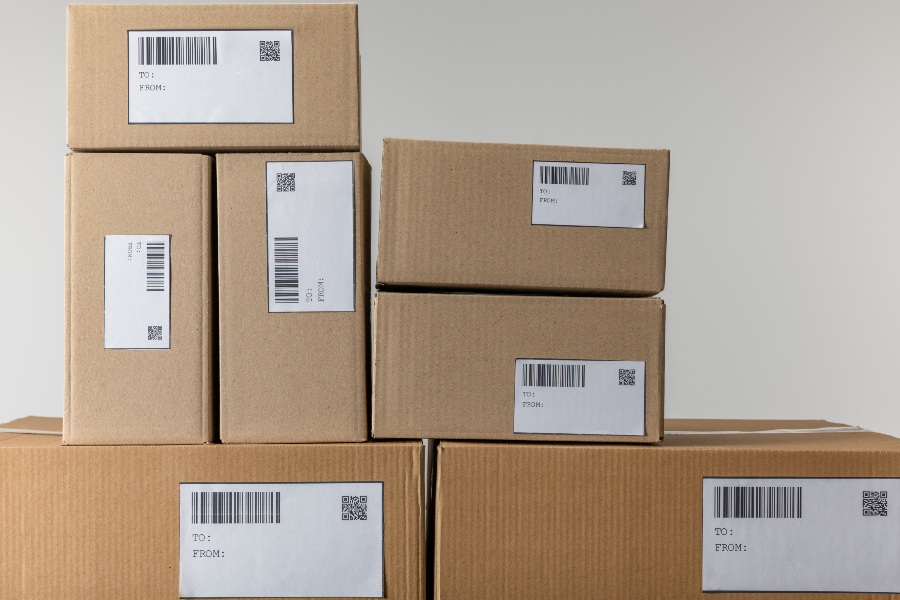What Is White Label Shipping?
White label shipping allows businesses to outsource their logistics to a third-party supplier while keeping their own brand identity centre for customers. By using white label shipping services, companies can present a cost-effective and professional delivery experience without managing the logistics themselves. This approach helps businesses focus on what they do best, while white label suppliers handle everything from custom packaging to delivery.
With rising expectations around delivery speed and reliability, offering branded products for shipping can directly influence a customer’s decision to order again. White label solutions give businesses higher profit margins by blending operational efficiency with brand consistency, making it easier to scale and build customer trust.
A Deeper Dive Into White Label Shipping
White label shipping is a business model where a third-party logistics provider ships private-label products under the retailer’s brand. This approach allows businesses to control the customer experience and brand experience, even though they do not manage shipping in-house. The 3PL provider will handle custom packaging, labelling, and delivery, but the shipment appears branded as if it came directly from the retailer. The order-fulfilment process, including logistics, picking, and packing, is managed by a 3PL provider, but all exterior branding reflects the retailer.
Key features include:
- Retailer Branding: Shipments carry the retailer’s logos, brand name, and information, not the same manufacturer's or fulfilment partner's.
- Custom Packaging: Options for tailored custom packaging materials, inserts, and customer communications.
- Seamless Integration: Systems link the retailer's online ordering process with the fulfilment centre, often via software application integration.
- Brand Recognition: The end customer interacts only with the retailer’s brand throughout the delivery experience.
Businesses often choose white label shipping to control customer perception, maintain brand consistency, build brand loyalty, and scale without building their own logistics network.
How White Label Shipping Works
The process starts when a retailer receives an online store order. That order is automatically sent to a fulfilment partner equipped to handle white label dropshipping. The fulfilment partner picks the custom product, prepares the packaging with the retailer’s branding elements, and handles all postage and carrier selection.
At dispatch, the package displays only the retailer’s branding elements and any chosen marketing materials. Customers receiving orders see the retailer as the sender. They will interact with the retailer for returns and support, not the fulfilment company.
A key aspect is software application integration, ensuring real-time updates, inventory management, and consistent tracking for both the retailer and customer. Payment for fulfilment is based on agreed service fees, typically per item or shipment.
Comparison to Traditional Shipping Solutions
Traditional shipping involves the retailer managing its own logistics, from packing the same product orders to negotiating directly with carriers. Branding options are often limited due to generic product packaging and constraints of in-house capabilities. This approach usually requires significant upfront investment in space, staff, and systems.
In contrast, white label shipping outsources logistics but keeps full brand control. The retailer does not have to handle the operational side of shipping or invest heavily in infrastructure, keeping minimal risk. Shipping volume can be more flexible, scaling up or down quickly as the business grows.
The main differences are summarised in the table below:
White label shipping provides businesses with branded, cost-effective delivery while removing the need to run their own logistics operations.
Let robots pack under your brand. Deep-dive into our robotic order fulfilment and hit targets with OTIF performance secrets, or arrange a platform demo. Reach (02) 9090 4747.
Benefits of White Label Shipping

White label shipping offers control over branding, stronger customer loyalty, and operational efficiencies that help reduce costs and streamline logistics. Businesses using this model retain their unique brand identity and improve customer trust while optimising resources.
Brand Consistency for Businesses
Maintaining brand consistency is crucial for companies seeking brand building, recognition, and trust. With white label shipping, businesses can customise boxes, packing slips, and return labels with their brand name rather than the logistics provider’s. This ensures every delivery matches the business’s established visual identity and messaging.
Branded packaging makes the origin of parcels immediately clear, reinforcing customer loyalty with each order. Consistent branding throughout the shipping process helps companies of all sizes stand out from competitors who use generic product packaging.
A table comparing custom branding with non-branded shipping can clarify the benefits:
Enhanced Customer Experience
White label shipping improves every stage of the customer experience, from unboxing to returns. Packages arrive looking professional and familiar, which increases trust and the likelihood of repeat purchases. Customers are less confused about where their order fulfilment originated, which reduces inquiries and returns due to uncertainty.
A streamlined unboxing process with premium packaging can create a positive lasting impression, encourage word of mouth, and even lead to user-generated content on social media. Clearly branded information on the parcel and inside ensures customers know who to contact if they need support or want to reorder.
These elements contribute to higher satisfaction scores and stronger brand loyalty.
Cost and Resource Efficiency
White label shipping allows businesses to outsource logistics to experienced third-party suppliers without losing control over the customer-facing aspect of delivery. This approach saves money by eliminating the need for in-house warehousing, packing staff, and shipping systems.
Aggregating shipping through a third-party supplier can secure better rates than handling logistics independently. Businesses benefit from the provider’s scalable infrastructure, advanced software applications, and process efficiencies.
Resource allocation improves as company staff focus on product development, marketing, start selling existing products, and refining their value proposition instead of supply-chain management. Businesses gain flexibility to scale operations without a large upfront investment in logistics assets or labour.
How to Set Up White Label Shipping

Setting up white label shipping means selecting the right provider, integrating them with existing systems, and ensuring every parcel reflects the retailer’s brand. Each stage requires clear processes, attention to detail, and communication with supply-chain partners.
Choosing a White Label Shipping Provider
Selection begins with identifying white label suppliers that offer consistent fulfilment and responsive support. Retailers should evaluate shipping speeds, geographic coverage, pricing, and reputation. It has become increasingly important to verify the provider’s ability to handle volume fluctuations and to respond to service issues promptly.
Key considerations include:
- Minimum order requirements
- Contract terms and fees
- Available shipping methods (standard, express, international, etc.)
- Tracking and customer notification systems
Requesting references and reviewing case studies can help assess provider performance. Establish a written agreement that covers branding rights, liability, and customer service expectations.
Integrating With E-Commerce Platforms
Seamless integration with e-commerce platforms is essential to automate order flow and reduce manual errors. Most providers offer plugins or APIs that connect directly to systems like Shopify, WooCommerce, or Magento. Retailers should test integrations carefully to confirm that orders, tracking data, and inventory sync accurately.
A step-by-step approach includes:
- Connect the provider’s system via plugin or API
- Map product SKUs to shipping profiles
- Set up automated email notifications and tracking updates
- Regularly review logs for errors or integration issues
Technical support should be available during the set-up phase to resolve compatibility or data-mapping problems.
Customising Shipping Labels
Branding extends to shipping labels and packaging, which should display the retailer’s logo, details, and chosen design elements. Providers often support custom templates, letting businesses add their brand while complying with carrier requirements.
When customising labels:
- Use matte white labels with black ink for clarity
- Ensure all barcodes are readable and addresses are accurate
- Test printing quality to prevent smudging or fading
Some providers allow custom inserts or branded product labels, which can reinforce brand identity. Retailers should approve samples before full implementation and periodically check the appearance of outbound parcels.
Ready to ditch DIY packing? See how to migrate from self-fulfilment and check real Express Post delivery times. Plan your growth with us today, call (02) 9090 4747.
Industries Using White Label Shipping

White label shipping is used by various business models, including private label dropshipping, to control customer experience and grow their brand without managing their own logistics. This approach allows companies to focus on branding, marketing, and customer service while outsourcing the fulfilment process to third-party suppliers producing white label products.
E-Commerce Retailers
E-commerce retailers commonly use white label niches to meet high order volumes and consumer expectations for fast, reliable delivery. By partnering with white label logistics providers, online shops can offer branded packaging, shipping labels, and tracking that strengthens their identity.
White label shipping lets e-commerce businesses save on warehousing costs and avoid the challenges of running their own distribution centres. Branded product lines may be stored, packed, and shipped by the provider, but appear to come directly from the retailer.
This model helps one company that is still starting to compete with larger, more established brands. They can quickly scale up during peak seasons, maintain consistent branding, and use advanced tracking systems provided by the logistics partner with white label services.
Subscription Box Services
Subscription box companies depend on white label shipping for customised, recurring deliveries. These businesses benefit from the logistics expertise of white label providers who handle the complexities of packing different exclusive products into individual boxes for each customer.
Using white label solutions, subscription services ensure every box arrives on time and is branded correctly. This is vital for maintaining a strong subscriber base and meeting quality standards expected by customers.
Shipping partners can also assist with returns management and inventory tracking. The consistency provided by outsourcing reduces errors and allows subscription brands to focus on product curation and customer engagement.
B2B Fulfilment Companies
Businesses serving other businesses, such as wholesalers or commercial supply companies, leverage white label shipping to manage bulk orders. These providers ensure that shipments are accurately picked, packed, and sent under the client company’s branding and product quality standards.
A B2B fulfilment partner often uses integrated systems so business clients can monitor inventory, track orders, and manage shipments from their own dashboard. White label fulfilment streamlines the process and reduces the administrative burden for business customers.
By handling both standard and custom shipping needs, white label partners help B2B companies deliver products efficiently, maintain brand consistency across channels, and improve customer satisfaction. This approach is especially important in industries where accurate, timely deliveries are critical to client operations.
White Label Shipping Challenges and Best Practices

White label shipping involves unique operational risks and opportunities. Businesses must address limitations, improve processes, and ensure compliance to achieve consistent brand delivery.
Potential Limitations and Issues
Outsourcing shipping through a white label provider often reduces direct control over product quality and customer experience. This can lead to issues like late deliveries, damaged goods, and miscommunication, all of which reflect directly on the retailer's brand.
Maintaining brand consistency is another challenge, as third-party providers may not always follow branding guidelines to the letter. Retailers may also struggle to access real-time updates or resolve shipment issues quickly due to limited access to the underlying logistics systems.
Further, supplier reliability is critical. Negative supplier reviews or inconsistent performance can damage customer trust. It's important to select partners with a proven track record and to set clear expectations regarding service levels.
Optimising Shipping Operations
Building a strong partnership with the 3PL provider is essential. Open communication, such as regular meetings and performance reviews, helps ensure standards are upheld and issues are resolved promptly.
Implementing platforms that provide shipment tracking and automated notifications can enhance transparency for both the retailer and the end customer. These systems reduce the risk of delays going unnoticed and support proactive problem-solving.
Retailers should regularly assess operational KPIs like on-time delivery rates, package damage incidence, and customer feedback. This allows continuous improvement and helps avoid systemic problems. Consider documenting best practices with your shipping partner to ensure clear expectations and accountability.
Regulatory and Compliance Considerations
Compliance with shipping and labelling regulations is non-negotiable. Different regions impose different requirements for product labelling, customs documentation, and logistics practices, making it critical for retailers and their partners to remain informed.
Responsible retailers must verify that their white label provider maintains all necessary certifications and stays up to date with relevant laws, particularly for international shipping and regulated categories like health supplements and pet products. Privacy and data-protection obligations also apply if customer information is shared with logistics partners.
Contracts should clearly outline the responsibilities for compliance, including who manages customs declarations, insurance, and returns. Periodic audits or legal reviews can reduce the risk of fines or shipment interruptions due to non-compliance.
SKUTOPIA: Powering White Label Shipping at Scale
SKUTOPIA makes white-label fulfilment simple with robotics-powered 3PL centres and a cloud-based platform that connects to over 100 global carriers. Your parcels ship fast, shipping directly to customers, cost-effectively, and always under your brand.
With 99.94% same-day dispatch and urban hubs in Sydney and Melbourne, Skutopia enables faster delivery without premium costs. Its carrier-agnostic system ensures optimal shipping while keeping your branding front and centre.
Easy integrations with platforms like Shopify and WooCommerce keep orders and inventory in sync. Transparent pricing and savings on postage make scaling predictable and efficient for a profitable business.
Let SKUTOPIA handle the logistics while you find suppliers, enter new markets, and grow your white label business today. Get started today or call (02) 9090 4747.
